Sea Otters in Crosshairs of Gallegly Bill
A Giveaway to Shellfish Industries

In mid-February, Representative Elton Gallegly, representing portions of Santa Barbara and Ventura counties, introduced a bill that represents a full step backward in sea otter conservation. The “Military Readiness and Southern Sea Otter Conservation Act” (aka House Resolution 4043) is deceptively titled as if it promoted the recovery of the threatened animal. In fact, it would undermine the current process of ending the antiquated no-otter zone.
Established in 1987, the no-otter zone prohibited sea otters from entering coastal waters south of Point Conception. However, failed in its purpose and is currently undergoing the process of being terminated by the U.S. Fish and Wildlife Service. The process should be complete by December.

H.R. 4043 requires that termination of the no-otter zone be stalled, again, while the U.S. Fish and Wildlife Service and the National Marine Fisheries Service complete an “Ecosystem Management Plan.” Under H.R. 4043, an Ecosystem Management Plan would have to ensure “the commercial harvest of shellfish fisheries at levels approximating current harvests.” Shellfish harvests in southern California have declined because of over-harvesting by the same groups that would benefit from this bill by requiring a plan that would maintain their current harvest levels – a license for shellfish industries to continue their irresponsible harvesting practices.
The Ecosystem Management Plan would also have to ensure the recovery of the endangered white and black abalone, though scientists have concluded over and over again that the decline of these species was not due to sea otters. Indeed, the two species can and do co-exist. The shellfish industry continues to promulgate the unproven belief that otters are the sole cause of the white and black abalone’s decline, because that idea conveniently supports the industry’s opposition to sea otter range expansion.
Sea otters, once numbering in the hundreds of thousands, were nearly eliminated from California in the 18th and 19th Centuries. Only in the past few decades has the species begun to recover, though the recovery has not been without its struggles. The latest survey found the population had declined by 3.6% to 2,711 animals. There is general consensus that, in order for the species to confront the varied obstacles it faces (from pollution and disease to food limitation), it must be allowed to naturally expand its range.
Sea otters should be allowed to swim freely, unobstructed by special interests. H.R. 4043 is no more than a handout to the shellfish industries, a veiled tactic aimed at obstructing termination of the no-otter zone and securing a restriction on the sea otter’s natural range. Halting natural range expansion would defeat the well-studied environmental benefits, economic gains, and jobs associated with tourism, sea otters, and a balanced and healthy ecosystem. H.R. 4043 is bad for otters, bad for jobs, and bad for the environment. It’s time to stand up to the obstructionists and to end the no-otter zone. Write your representatives to oppose H.R. 4043.
Jason Lutterman is program manager for Friends of the Sea Otter.



